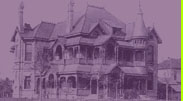WHO'S WHO - EDDY C. SCURLOCK
(1905 – 1988)
"Let all your things be done with charity."—I Corinthians 16:14 Eddy C. Scurlock, the founder of Scurlock Oil, lived his life very much in synch with the injunction of the apostle Paul. Asked near the end of his life to estimate his total giving's, one of Texas’ most notable philanthropists humbly brushed the question aside: "I never counted."
People who follow such matters estimate that Scurlock probably poured out half his wealth through organizations like the Scurlock Foundation, established almost four decades ago. Medical institutions and schools benefited enormously, particularly those associated with the Methodist Church.
Lon Morris College in Jacksonville, for example, was able to train many ministers by virtue of Scurlock, who rescued the institution the minute the Methodist bishop of Houston alerted him to its importance.
Scurlock grew up in East Texas in the tiny town of Tenaha, near Carthage. After high school, the young entrepreneur signed on at a Standard Oil pipeline construction site as a kitchen assistant. Afterwards, he moved to Houston and bought a gas station.
In 1936, with borrowed money, he formed Scurlock Oil, a tank car marketer of petroleum products, which emerged as an important transporter of crude oil and condensate. A decade later, Scurlock bought a Houston refinery and rechristened it Eddy Refining Company.
"My respect and admiration for the man are just unlimited," recalled Jack Blanton, a Scurlock employee for 32 years. "He started absolutely from the ground up. In the thirties, when he set up his own business as a commission bulk agent, many fields had no product pipelines. He developed the whole concept of gathering the oil that was out there in all these unconnected fields. He was the first to lead the way in getting oil to market."
By truck, barge or pipeline, Scurlock and his employees were transporting 200,000 barrels a day in 1982, the year the company was bought by Ashland Oil.
Scurlock was "hands on" all the time, and would stay up all hours of the night until the smallest field problem was settled to his satisfaction. Employees remember him as an outgoing friend with whom it seemed unusually easy to communicate.
A close personal friend of many Houston oil tycoons, Scurlock was especially close to his men in the field.
"He was a very unique individual who paid absolutely no attention to rank or wealth," Blanton noted. "A widely respected man who was comfortable with the lowest—paid person on the streets."
Scurlock was an advisory director of Texas Commerce Bank, a past chairman of St. Luke’s United Methodist Church, and a director of Lon Morris College and Texas Medical Center.
Shortly after Scurlock’s death in 1988, a tribute was held that encapsulated the esteem in which Houston society held the self-effacing country boy whose fanciest diversion was a game of gin rummy.
Throughout the evening, speakers lauded the man’s incredible magnanimity and proclaimed how indebted all Houstonians were to Scurlock for schools, hospitals, and virtually everything that makes and builds a great American city.






